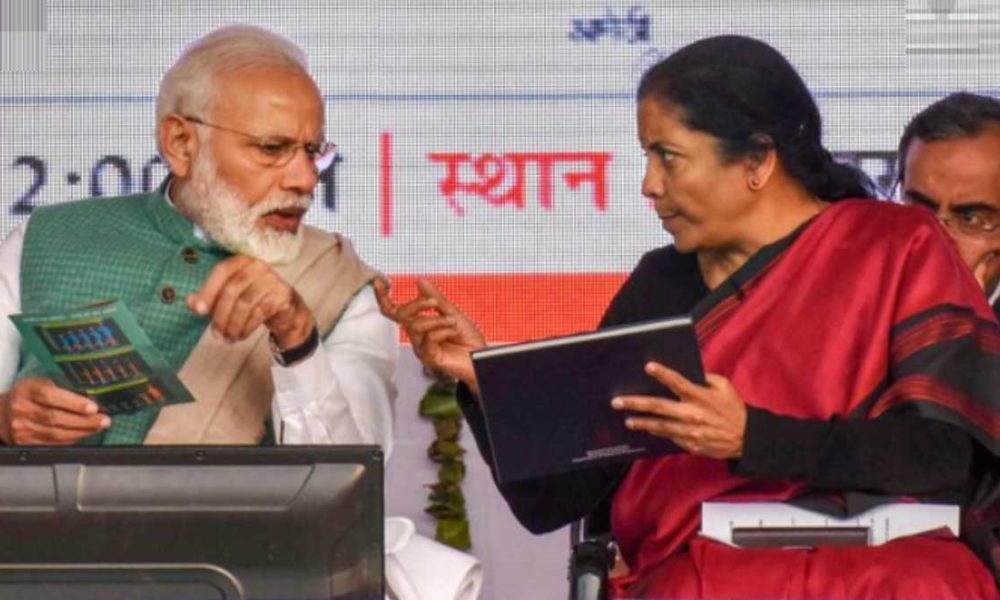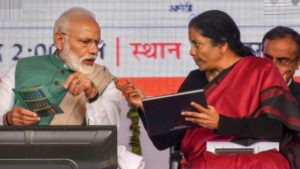After nearly one month from the declaration of Aatmanirbhar Bharat Abhiyan and nearly 2.5 months after declaration of the Lockdown 1.0, we are seeing an ascending legitimacy and social trust in the Narendra Modi-led Central government. This is primarily a result of the leadership skills and understanding of PM Narendra Modi to not merely deal with this pandemic, rather convert it into a unified battle and unique chance for Indians to convert this into an opportunity to excel and progress. In the recent public interaction, he has confidently reiterated this goal of the Aatmanirbhar Bharat Abhiyan and the path to be followed.
One of the distinguishing features of a credible and successful leadership is to not lose sight of the long-term goals while dealing with a crisis. It is an essential attribute of deft crisis leadership. It is a welldocumented and established fact that the economy of India has suffered heavily due the pandemic-induced lockdown stretched till 31 May. However, it is important to note that even while dealing with this immediate challenge, the government’s economic package has remained inclusive, holistic and visionary. The package has clear and indelible imprints of the confluence of the economic thoughts of Gandhi, Deendayal Upadhyay, and Dattopant Thengadi. Even while taking due care of the necessities of food, medicine and other essential items, the government has invested its energy and resources in metamorphosing and bringing about fundamental structural changes in the economic system via reforms. The ‘SelfReliant India Movement’ has filled India with exuberance and confidence to aspire and achieve. The Covid-19 crisis is a very painful crisis, but India has decided to use it as an opportunity to convert this into a historic opportunity. The details of the action last month towards the goal have established that Indian Government is fully committed towards it and that the people have embraced it with open hands. On one hand, through the Pradhanmantri Gareeb Kalyan Yojana and other means, the Government has taken due care of the concerns of the downtrodden and economically weaker sections of community, and on the other, we have decided to invest nearly 10% of the GDP(20 Lakh Crores) through various means to provide impetus and hand-holding to the diverse sections of Industry — from street vendor to MSME to the corporate houses.
The detailed package has facilitated mechanisms where a person may start industrial production through local resources even while eyeing for the global market. For example, reforms in APMC Law, Fisheries, Animal Husbandry, MSME, Agriculture etc. will provide a stable, inclusive, financially accessible and assistive environment to grow. These developments are in tune with the economic thoughts of Saintly Intellectual Dattopant Thengdi who has repeatedly reiterated that as India is a labour-surplus country, therefore to ensure that the model of economic development is balanced, the labour-intensive industries must be focused. He has given a motto- ‘Industrialization of Rashtra, Labour-intensification of business, and nationalization of Laborers’. Dattopant believed that the partnership, importance and weightage of labourers must be increased in business as labour is easily available in India. The declaration to provide a stimulus of Rs 10,000 crore and Rs 15,000 crore to foodprocessing and dairy reflects that the government has embraced the path suggested by Dattopant Thengdi. Similarly, Gandhi believed in the idea of Village based economic model and for this it was important to end the license-permit Raj and that people doing animal husbandry must also be treated as a farmer, and that a person is now free to sell his products anywhere. Economic history expert Sanjeev Sayal has said that the reforms in the agricultural sector shall be an end to the 700 year ordeal of the farmers. He has observed that from the times of Allaudin Khilji, the farmers were not allowed to see their produce at an open price as the marker was controlled by the ruler. He identified this as a prominent cause for the poverty of farmers. In the regard, the reforms initiated by the Central Government will be an important effort towards the dreams of Mahatma Gandhi.
The idea of JAM (Jandhaan, Aadhaar, Mobile) Trinity based modelling of schemes for the welfare of the poor is driven by the inspiration of Antyoday provided by Deen Dayal. In his model of economic development, ‘work for each hand’ is critical and essential. The present package reserving Rs 3 lakh crore for collateral free loans will create a way and ecosystem for the talented prowess of youth aiming for self-employment. This loan will pave the way for establishment of small scale industries and businesses at the village and tehsil level. This shall transform them from ‘job-seeker’ to ‘job-provider’. Besides this, it will provide employment to the local people in their surroundings.
In this way, we find that the efforts of the Government have irrefutable influence and confluence of the economic thoughts of Gandhi, Deen Dayal and Dattopant Thengdi. The confluence of this trinity creates an elixir and potent medicine to address longstanding imbalances in the economic structure.
If we look at the past, we find that there are lots of imbalances in the economic order based on agriculture, industry and service sectors. We particularly observe the historic burden upon the agricultural and industrial sector. From a point of time, when in the beginning of the 18th century, India had 29% share in the global products; the 200 year long colonial rule has led to visible and large shrinking of this share. Even after achieving independence in 1947, this colonial legacy, along with the centralised planning and redtapism had led to an economic policy which has never suited the Indian physic.
India grew slowly in comparison to the expected pace. Economic Planners like Mahalnobis became the creator of India’s fate. They believed that the heavy and big industries were the key to India’s development and distributed all industries to few metropolitan cities. The small and cooperative based industries were overlooked. Similarly the neglect of agriculture converted it into a business of loss. All of this resulted in the conversion of farmers and rural skilled workmen into the migrants of large cities for employment.
The magnitude of migrant labourers in crores is a depressing example of the economic imbalance of the economic system. We must understand that when a person migrates from his village or town, it is not the case of movement of an individual, rather it is a painful separation from his family, society and local practices, The recent reverse-migrant of the migrant labourers during the lockdown has put this question at the centre of national debate.
If the people born in villages and towns are provided better economic opportunities at the local level, they may produce wonderful results from their energy and talent. For the ‘Swadeshi-based’ economic system, it is extremely prudent to focus on the domestic production of all products essential for domestic consumption. It is quite evident from the detailed package that the Government is focused on strengthening the agricultural and MSME industries along with handloom based industries to suggest durable and long-term solutions to our economic problems.
Under the exemplary leadership of India’s Prime Minister Narendra Modi, the government has taken a brave leap to use this crisis to convert India into an ‘Atmanirbhar Bharat’. When the opposition and intellectual community was limited to only addressing the momentary questions, the government has clearly signaled that besides addressing these problems, the Government shall proceed with fundamental changes.
The government hasn’t panicked or shown overzealousness to merely start the dormant economy, but has tried to provide an entirely new design by meticulously attempting to bring about paradigm shifts and a new model of economy. All segments of society must experience that this is a golden opportunity to take concrete steps to address long-awaited targets while dealing with a slowdown tornado.
The author is the National JointOrganising Secretary of ABVP.














